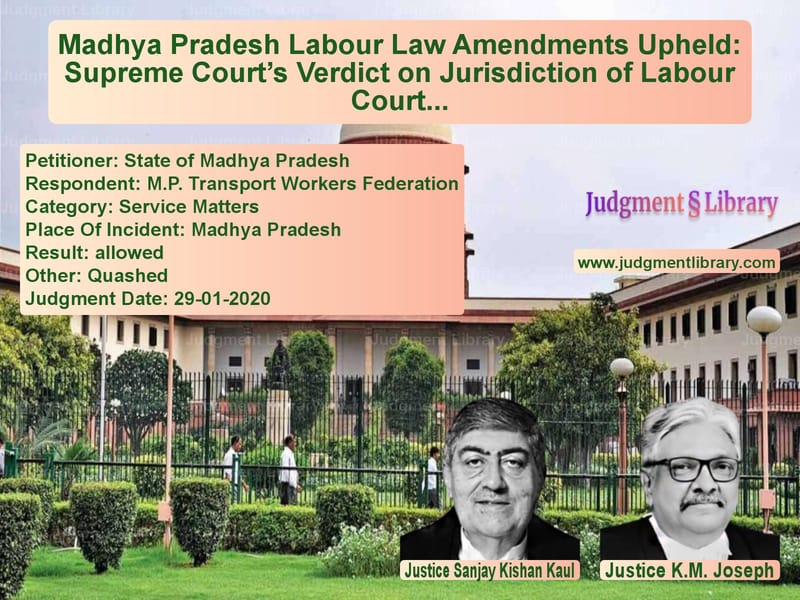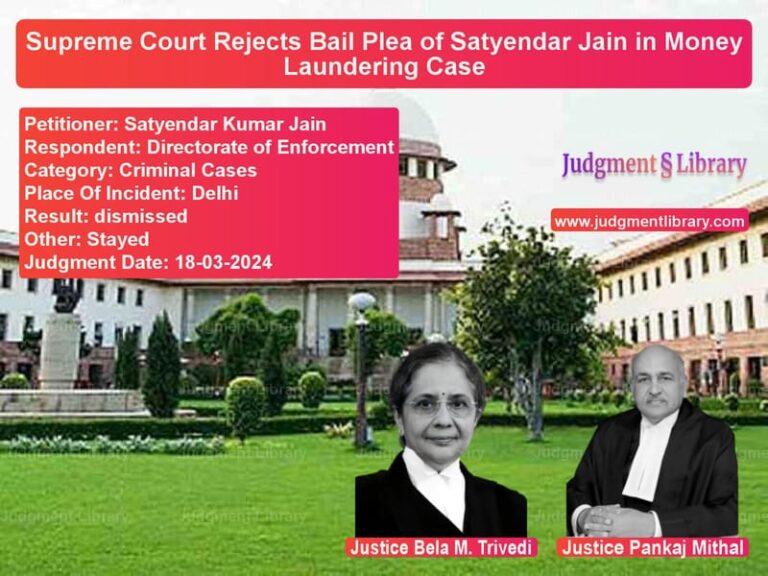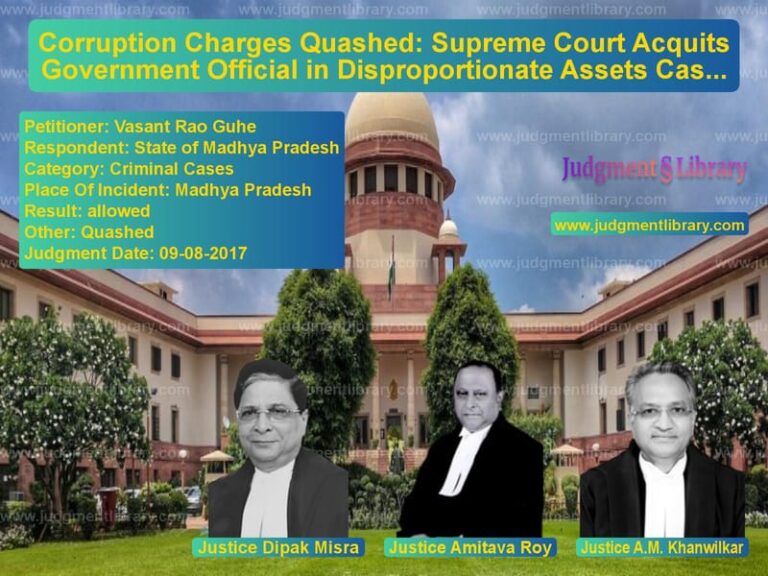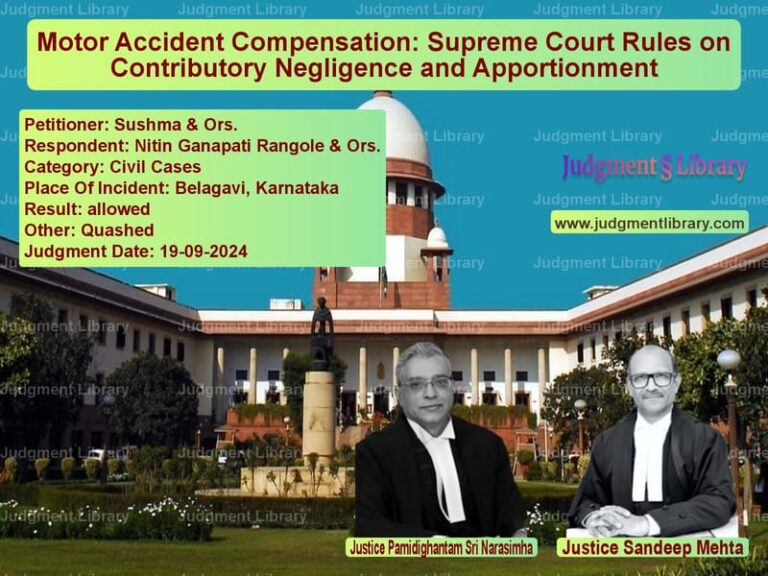Madhya Pradesh Labour Law Amendments Upheld: Supreme Court’s Verdict on Jurisdiction of Labour Courts
The case of State of M.P. & Anr. vs. M.P. Transport Workers Federation revolves around a constitutional challenge to the Madhya Pradesh Labour Laws (Amendment) and Miscellaneous Provisions Act, 2002. The amendment sought to revert the jurisdiction of criminal cases related to labor law violations from Labour Courts to regular criminal courts. The Supreme Court was called upon to decide whether this legislative change was unconstitutional and whether it infringed on the right to speedy justice.
Background of the Case
The legal dispute began when the Labour Bar Association, Satna, and the M.P. Transport Workers Federation challenged the amendment, arguing that it was unconstitutional. The amendment reversed a 1981 law that had granted Labour Courts the authority to adjudicate offenses under 16 different labor law statutes. Before 1981, these offenses were tried in regular criminal courts. The 2002 amendment sought to restore the pre-1981 system, citing the excessive workload of Labour Courts.
The High Court of Madhya Pradesh struck down the amendment in an elaborate judgment, ruling that it violated Article 21 of the Indian Constitution, which guarantees the right to a speedy trial. The state of Madhya Pradesh appealed this decision to the Supreme Court.
Arguments by the Petitioner (State of Madhya Pradesh)
The State of Madhya Pradesh contended that the amendment was enacted to streamline the judicial process and relieve the burden on Labour Courts. The state’s counsel argued:
“The Labour Courts were originally established to handle industrial disputes, not criminal offenses. The increasing backlog of cases made it impractical for them to handle additional responsibilities related to labor law violations.”
The state further contended that the High Court overstepped its jurisdiction by striking down a law that had been duly passed by the legislature and had received the assent of the President of India.
Arguments by the Respondents
The respondents, led by the M.P. Transport Workers Federation, argued that transferring cases back to regular criminal courts would lead to undue delays and hinder the enforcement of labor rights. They contended:
“The original intent of the 1981 amendment was to ensure swift justice for labor-related offenses. The 2002 amendment undoes decades of progress and subjects workers to unnecessary delays in the regular criminal courts.”
They further claimed that the amendment violated Article 21 by effectively denying workers their right to speedy justice.
Supreme Court’s Observations
The Supreme Court examined whether the amendment violated fundamental rights under Article 21. The Court noted:
“The scope of judicial review of legislative action is limited to two grounds: (1) lack of legislative competence and (2) violation of fundamental rights. In this case, there is no question of legislative incompetence, and the amendment does not violate Article 21.”
The Court emphasized that the legislature had the authority to determine the appropriate forum for handling labor-related offenses. The judgment stated:
“The wisdom of the legislature cannot be substituted by judicial review. It is not the function of this Court to assess whether the Labour Courts or criminal courts are better suited for handling these cases. That is a matter of legislative policy.”
Final Judgment
The Supreme Court allowed the appeal, ruling that:
- The Madhya Pradesh Labour Laws (Amendment) and Miscellaneous Provisions Act, 2002, is constitutional.
- The reversal of jurisdiction from Labour Courts to regular criminal courts does not violate Article 21.
- The impugned High Court judgment was set aside.
- The amendment shall continue to be in effect, and labor-related offenses shall be tried in regular criminal courts.
Implications of the Judgment
This ruling has significant implications for labor law enforcement in Madhya Pradesh. It establishes that:
- Legislatures have the authority to decide the appropriate judicial forum for different types of cases.
- The right to a speedy trial under Article 21 does not automatically preclude legislative changes to court jurisdiction.
- Labour-related offenses will now be adjudicated in regular criminal courts, potentially affecting the speed at which such cases are resolved.
Conclusion
The Supreme Court’s decision underscores the principle that courts should not interfere with legislative policy decisions unless they violate fundamental rights. While the ruling upholds the state’s authority to regulate judicial forums, it also raises concerns about potential delays in justice for workers. The judgment serves as a precedent for future cases involving the reallocation of judicial responsibilities.
Petitioner Name: State of Madhya Pradesh.Respondent Name: M.P. Transport Workers Federation.Judgment By: Justice Sanjay Kishan Kaul, Justice K.M. Joseph.Place Of Incident: Madhya Pradesh.Judgment Date: 29-01-2020.
Don’t miss out on the full details! Download the complete judgment in PDF format below and gain valuable insights instantly!
Download Judgment: State of Madhya Prad vs M.P. Transport Worke Supreme Court of India Judgment Dated 29-01-2020.pdf
Direct Downlaod Judgment: Direct downlaod this Judgment
See all petitions in Employment Disputes
See all petitions in Public Sector Employees
See all petitions in Disciplinary Proceedings
See all petitions in Legal Malpractice
See all petitions in Judgment by Sanjay Kishan Kaul
See all petitions in Judgment by K.M. Joseph
See all petitions in allowed
See all petitions in Quashed
See all petitions in supreme court of India judgments January 2020
See all petitions in 2020 judgments
See all posts in Service Matters Category
See all allowed petitions in Service Matters Category
See all Dismissed petitions in Service Matters Category
See all partially allowed petitions in Service Matters Category







